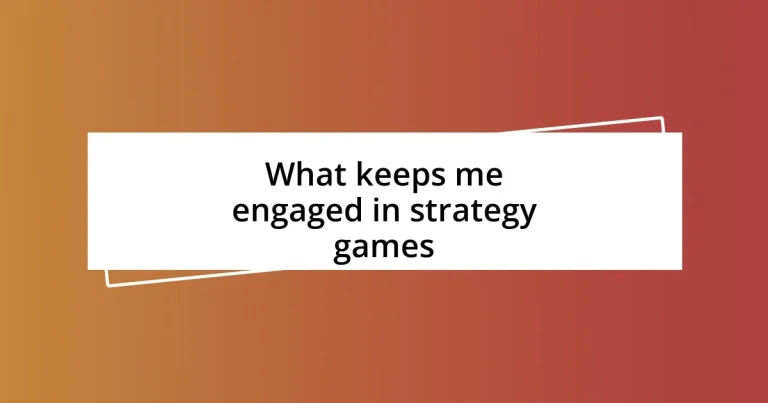Key takeaways:
- Strategic decision-making is essential; each choice impacts the game’s outcome and enhances engagement through urgency and critical thinking.
- The balance of challenge and difficulty is crucial; players thrive on facing tough opponents but can lose interest if the game is too easy.
- Social interactions and shared experiences elevate gameplay; forming alliances and engaging in post-game discussions foster community and memorable moments.
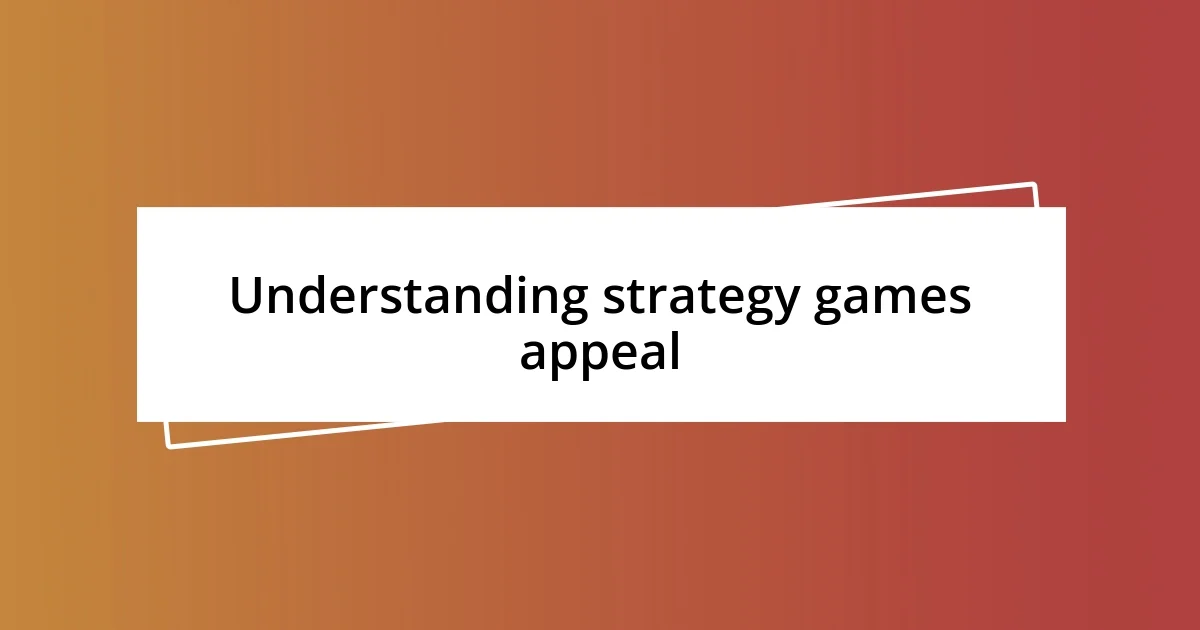
Understanding strategy games appeal
One of the main draws of strategy games for me has always been the thrill of outsmarting opponents. I remember a late-night gaming session where I felt a rush of adrenaline as I executed a carefully planned ambush that completely turned the tide of the game. How satisfying is it to see your strategic vision come to life? That sense of achievement makes every moment spent analyzing the battlefield worth it.
There’s also something incredibly gratifying about the mental challenge these games present. I often find myself reflecting on how each decision can have a ripple effect. Have you ever faced a situation where you second-guessed your moves? I recall a time when I hesitated and ultimately lost because I got caught up in the complexities of my plan. It taught me that embracing the unpredictability is a crucial part of the strategy.
Moreover, the storytelling aspect of many strategy games creates a compelling atmosphere that pulls me in. I can recall sinking hours into a game where every character had a backstory that intertwined with my decisions. Isn’t it fascinating how strategy games often force us to weigh moral choices against practical advantages? This blend of narrative and tactical depth keeps me engaged long after I’ve stepped away from the screen.

Key elements of engagement
One key element that keeps me engaged in strategy games is the sense of progression. As I advance through levels or complete objectives, I experience a rush of accomplishment that fuels my desire to continue. I remember the sheer excitement I felt unlocking a new unit after countless hours of strategizing and investing my resources wisely. There’s a sense of ownership in that progression, almost like planting a seed and watching it grow.
Another aspect is adaptability. Strategy games often require you to adjust your tactics based on the decisions of opponents or unforeseen circumstances. I vividly recall a match where my carefully laid plans went awry because an opponent took an unexpected move. Instead of being frustrated, I embraced the challenge, shifting my strategy and ultimately taking control again. That feeling of learning to adapt keeps my mind sharp and makes every gaming session uniquely thrilling.
Finally, the social interaction within these games can be incredibly engaging. I cherish moments spent with friends, strategizing and laughing over our choices. The shared victories and defeats create memories that linger long after the game is over. Have you ever felt that rush of camaraderie while coordinating a complex plan with friends? Those moments solidify my connection to the game and elevate my overall experience.
| Element | Description |
|---|---|
| Progression | Advancing through levels or unlocking new features gives a sense of achievement and drive. |
| Adaptability | Adjusting strategies based on unforeseen challenges keeps the game dynamic and engaging. |
| Social Interaction | Playing with friends fosters connection and shared experiences, making each session memorable. |
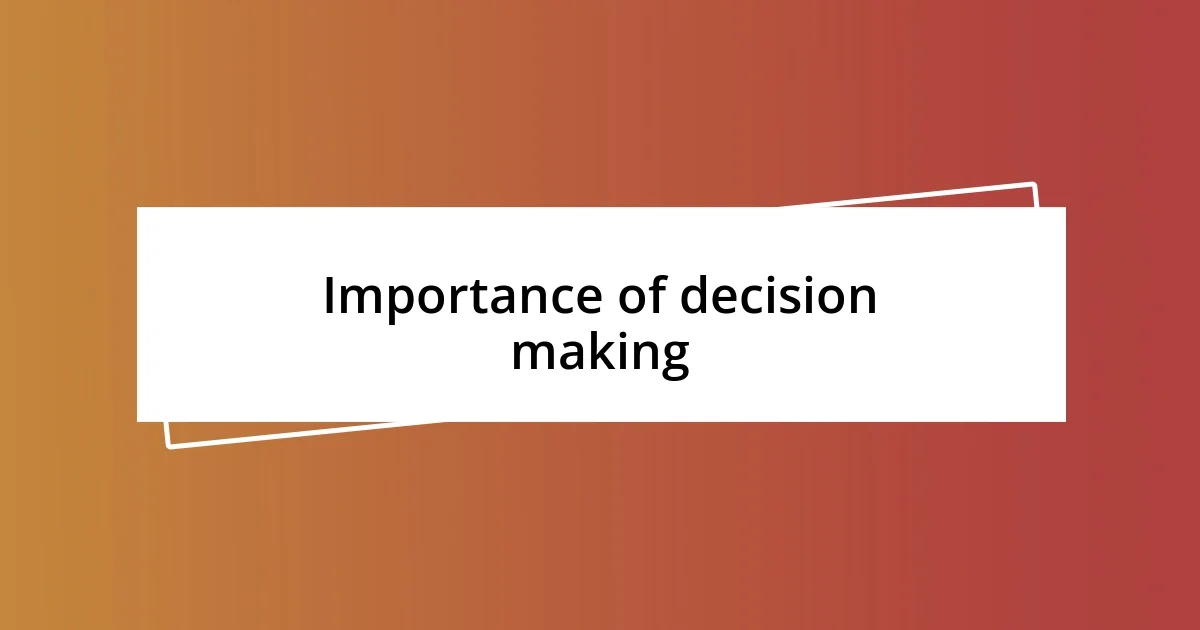
Importance of decision making
Making decisions in strategy games is not just a crucial mechanic; it’s what truly makes the experience exhilarating. Each choice I make can drastically alter the course of the game or even the fate of my character. I still remember a fierce battle where I had to decide whether to attack or regroup. The pressure was immense, and I felt my heart race as I chose offense over defense. In that moment, I realized that the weight of my decisions is what keeps me invested and on the edge of my seat.
- My decisions often lead to unexpected outcomes, which can be both rewarding and punishing.
- Those high-stakes moments create a sense of urgency and excitement that keeps me engaged.
- Analyzing the potential consequences of each choice pushes me to sharpen my critical thinking skills and grow as a player.
As I dive deeper into a game, I often find myself reflecting on the psychological aspect of decision-making. I recall a tense multiplayer match where I had to bluff my opponent into thinking I was about to launch a massive attack. The anxiety of maintaining that façade was just as thrilling as the gameplay itself. That psychological interplay between strategy and deception is irresistible. Being able to weigh multiple factors—like resource management and opponent behavior—adds a layer of complexity that I find absolutely fascinating. Balancing those decisions turns every moment into a strategic puzzle I’m eager to solve.
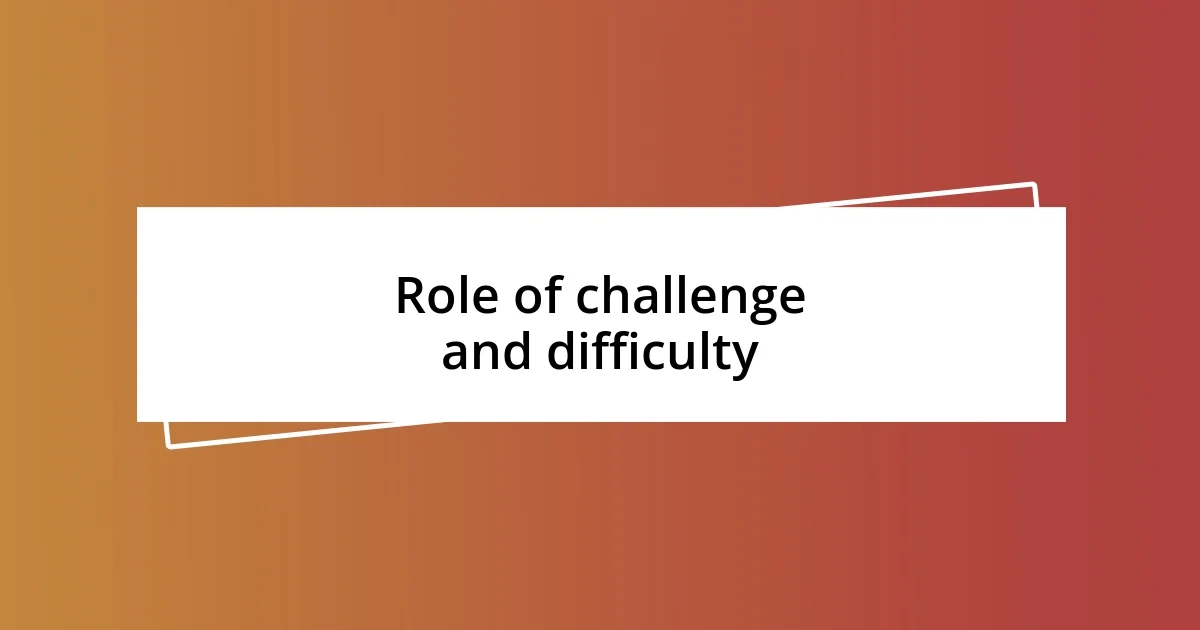
Role of challenge and difficulty
When playing strategy games, I crave a challenge that tests my skills and keeps me on my toes. The thrill of facing a difficult opponent can elevate my experience to new heights. I remember one game where I encountered a rival whose tactics were unlike anything I had faced before. Each encounter pushed me to refine my strategy, and that sense of struggle just made the victory feel even sweeter.
Difficulty levels can really influence my engagement. If a game becomes too easy, I often lose interest quickly. I find myself longing for that perfect balance where I’m challenged but not overwhelmed. There was this one instance when I was stuck on a level for what felt like ages, but once I finally figured it out, the rush of accomplishment was indescribable. Have you ever experienced that blend of frustration and exhilaration? It’s that depth of challenge that grips me and makes me want to dive back in for more.
Ultimately, the satisfaction derived from overcoming obstacles keeps me coming back for more. Each defeated challenge feels like climbing a mountain; the higher I go, the more breathtaking the view becomes. It’s this journey that fuels my passion for strategy games, making every moment spent immersed in them incredibly rewarding. Do you agree that it’s those tough battles that truly define our gaming experiences?
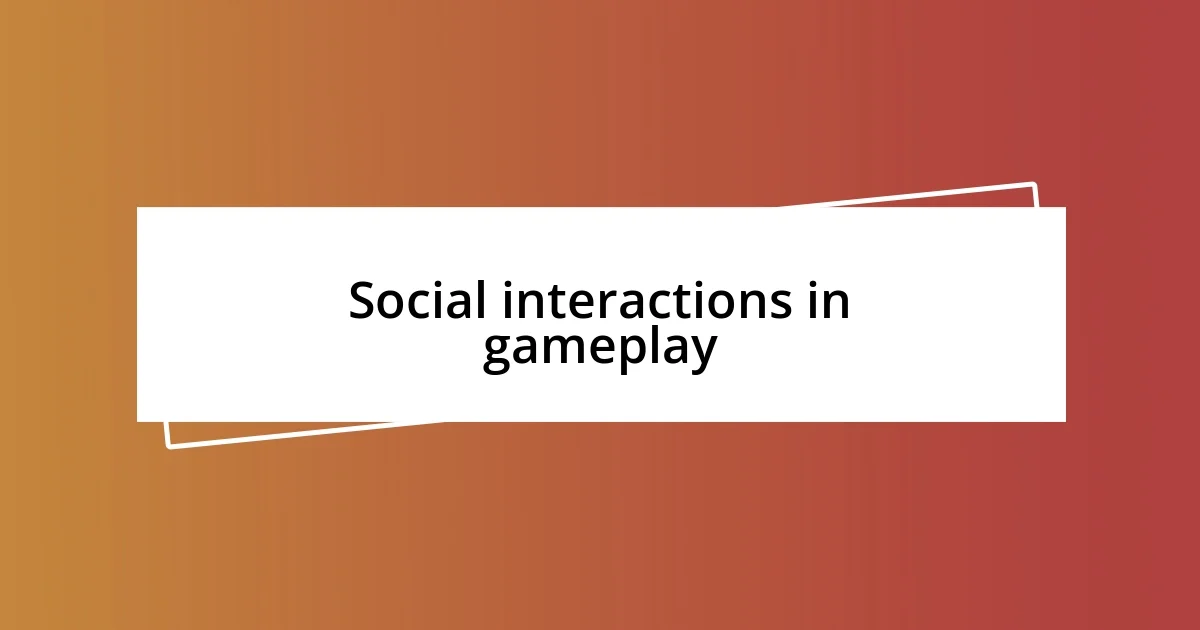
Social interactions in gameplay
When I think about social interactions in strategy games, I always remember the thrill of forming alliances with other players. There was a memorable session where I joined forces with a stranger. We worked together, sharing resources and executing plans that turned the tide of the game. I’ve always believed that these cooperative moments create a deeper bond, adding an emotional layer to the competition. Have you ever formed an unexpected partnership that changed everything?
Competition is another thrilling aspect that keeps me engaged with others. I can still recall a heated match where rivalries sparked conversations full of taunts and strategies. The banter, often filled with laughter or playful teasing, intensified the entire experience. It adds a unique tension to the gameplay that makes me feel alive. Don’t you find that these interactions make victories even sweeter and defeats more bearable?
Then there’s the memorable aftermath of these social dynamics when we all gather in the chat after a game. Sharing post-game reflections, whether it’s celebrating a well-executed plan or analyzing a blunder, feels incredibly fulfilling. I cherish those moments when players bond over their shared experiences, often leading to laughs and new friendships. It’s these social connections that truly elevate the gameplay and bring a sense of community to my gaming experience. What’s your favorite memory of connecting with fellow players?
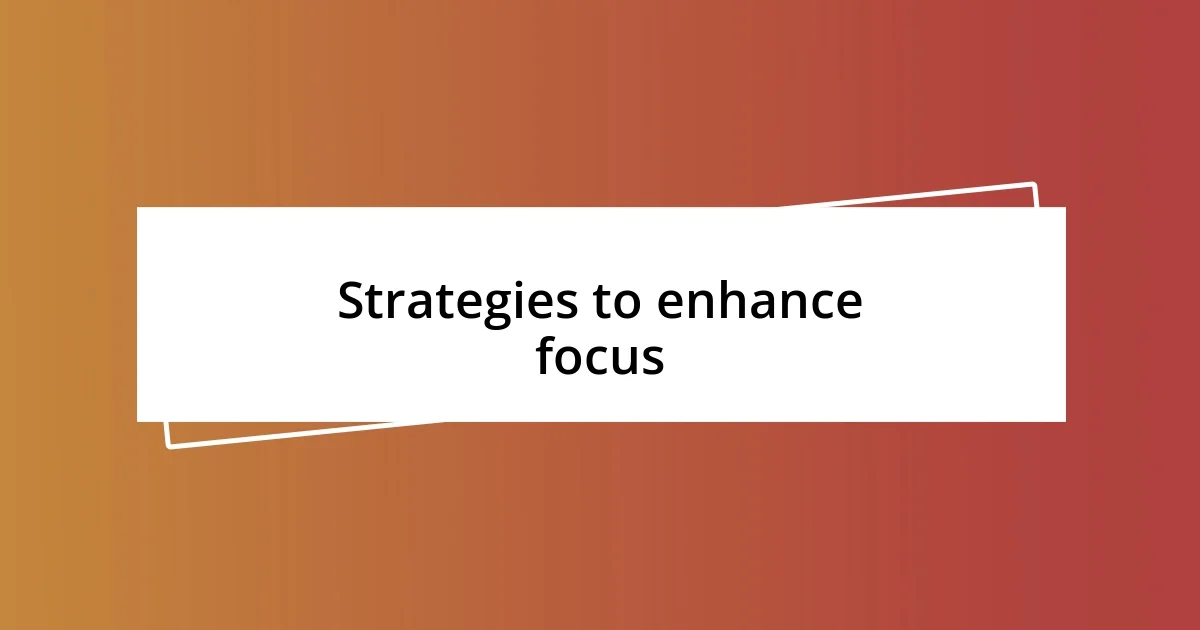
Strategies to enhance focus
In strategy games, I often find that setting clear, achievable goals significantly enhances my focus. I like to break down the game into bite-sized objectives. For instance, during a recent session, I aimed to capture a specific territory before the end of the hour. This immediate goal kept my mind sharp and my excitement bubbling, as I laser-focused on the tactics needed to achieve it. Have you ever tried focusing on short-term goals to maintain your interest?
Another technique that works wonders for me is eliminating distractions from my environment. When I recently played a complex strategy title, I turned off notifications and set up a dedicated gaming space. This simple act made a big difference; I felt completely immersed in the game without external interruptions. It’s surprising how much a clean, designated area can enhance my concentration. Do you have your own ritual for creating a distraction-free zone?
Finally, I’ve discovered that varying my gameplay style or experimenting with different factions keeps my mind engaged. I remember playing a game as an underdog faction, which forced me to think outside the box. I had to strategize differently, and this novelty invigorated my focus. There’s simply something refreshing about stepping into unexpected roles that can enhance your overall game experience. Have you found that trying out new strategies or characters reignites your passion for the game?

Tips for staying engaged
Staying engaged in strategy games often hinges on how I manage my time during each play session. For instance, I like to set a timer for myself, maybe an hour or so, which keeps me on my toes. It’s as if that ticking clock adds a sense of urgency that heightens my focus and immerses me in the game. Do you find that a sense of time pressure helps you stay engaged, or does it make the experience more stressful?
I’ve learned that taking deliberate breaks can also revitalize my interest. After a particularly intense match, I often step back for a few minutes to stretch and clear my head. This not only helps in preventing burnout but gives me a fresh perspective when I jump back in. It’s almost like resetting my mental state—have you noticed a difference after taking breaks in your gameplay?
On top of that, I’ve found that creating personal challenges can keep the gameplay lively. Recently, I decided to play a game with only one type of unit, which forced me to rethink my strategies entirely. The thrill of overcoming obstacles with limited resources brought a whole new level of excitement, reminding me just how creative I can be—even within restrictions. What unique challenges have you set for yourself to keep things interesting?












